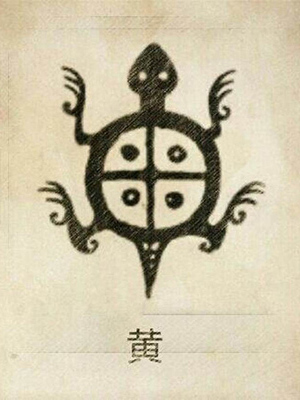The Huang(huáng) surname, one of the oldest in China, carries the memory of Chinese civilization spanning thousands of years. From ancient totem worship to the diverse development of modern society, the history of the Huang surname is like a grand epic, witnessing the rise and fall of Chinese civilization and its integration with other cultures.

I. Origins of the Surname:
1. Descendants of Boyi
Boyi, a key figure in flood control during the reign of Emperor Shun, was granted the surname Ying. His descendants established the Huang State in present-day Henan during the late Shang and early Zhou dynasties. After the Huang State was conquered by the Chu State in 648 BCE, its people adopted "Huang" as their surname.
2. The Shaohao Clan
Another branch traces back to Taitai, a descendant of Shaohao, who established the Huang State in the Fen River basin (modern Shanxi). After the state was annexed by the Jin State, its people took "Huang" as their surname.
3. The Luzhong Lineage
Luzhong, son of the fire deity Zhurong, was granted the land of Huang, and his descendants adopted the place name as their surname.
4. Official Titles and Name Changes
Some Huang lineages originated from official titles like "Yellow Dragon Master" during the era of Fuxi and "Yellow Cloud" during the reign of the Yellow Emperor. Additionally, other surnames like Wang, Lu, and Wu were changed to Huang due to historical events or phonetic similarities.
5. Ethnic Integration
The Huang surname also absorbed members from ethnic groups like the Hui and Manchu, reflecting China's long history of cultural assimilation.
II. Historical Figures:
1. Philosophy and Scholarship
Huang Zongxi: a Ming-Qing transitional thinker, proposed democratic ideas such as "the world belongs to the people, not the ruler," earning him the title of the father of Chinese enlightenment.
Huang Shigong:a recluse during the Qin-Han period, influenced Daoist philosophy and mentored the strategist Zhang Liang.
2. Art and Innovation
Huang Gongwang:a Yuan Dynasty painter, revolutionized landscape art with masterpieces like Dwelling in the Fuchun Mountains.
Huang Daopo:a textile innovator during the Song-Yuan period, revolutionized cotton spinning and is revered as the "Mother of Textiles."
3. Patriots and Reformers
Huang Xiang:a Han Dynasty filial piety icon, is celebrated in The Twenty-Four Filial Exemplars.
Huang Xing:a key leader of the 1911 Revolution, worked alongside Sun Yat-sen to overthrow the Qing Dynasty.
Huang Xuhua:the father of China's nuclear submarines, dedicated 30 years in secrecy to advance the nation's technological capabilities.
III. Cultural Significance:
1. Clan Halls and Ancestral Homelands
The Jiangxia Hall, named after Huang Xiang's filial deeds, serves as a unifying symbol for Huang descendants worldwide.
The Kuanhe Hall commemorates Huang Ba's governance philosophy of "benevolence and harmony," reflecting Confucian ideals.
2. Migration Patterns
From the three major southward migrations (to Fujian during the Wei-Jin period, Guangdong during the Tang-Song era, and Taiwan during the Ming-Qing dynasties) to modern diasporas in Southeast Asia and the Americas, the Huang surname's history mirrors China's demographic shifts.
3. Symbolism and Identity
The color yellow, symbolizing earth and abundance in Chinese culture, imbues the Huang surname with connotations of stability and prosperity. Ancestral worship and clan rituals reinforce a shared identity among Huang descendants.
IV. Social Impact:
1.population distribution
With over 27 million bearers, Huang is the seventh most common surname in China, concentrated in the Pearl River Delta. Huang entrepreneurs, like Colin Huang of Pinduoduo, are prominent in China's economic landscape.
2.Global Influence
Overseas Huang communities, numbering 4.5 million, have established transnational clan associations. Events like the annual Jiangxia Hall gatherings in Malaysia attract thousands, serving as cultural exchange hubs.
3.Contemporary Contributions
From Huang Xuhua's scientific breakthroughs to Huang Boyun's advancements in education, Huang individuals continue to shape modern society, embodying the surname's spirit of adaptability and innovation.
Conclusion:
The history of the Huang surname is not just a family chronicle but a microcosm of Chinese civilization's diversity and resilience. From the banks of the Yellow River to the shores of the South China Sea, from ancient sages to modern pioneers, the Huang surname exemplifies the enduring values of perseverance, inclusivity, and innovation. To explore the Huang surname is to uncover a vital thread in the tapestry of human history.